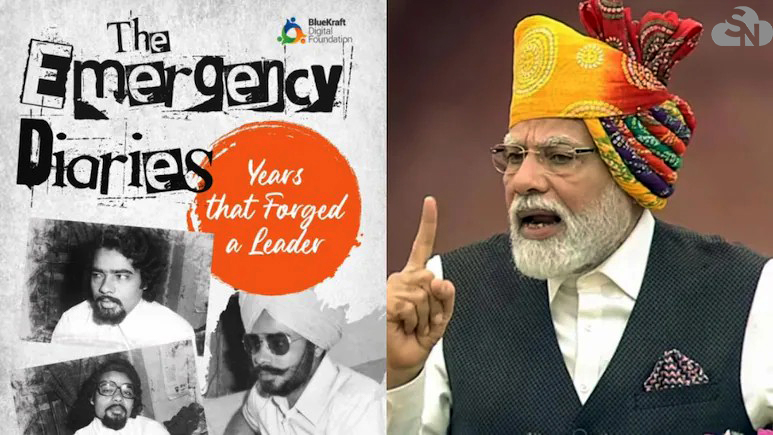This evening, Union Home Minister Amit Shah will launch his latest book, The Emergency Diaries. Earlier today, Prime Minister Narendra Modi introduced a new book commemorating 50 years since the Emergency was declared in India. It details his own experiences during that time and how they influenced his development as a leader.
The Emergency Diaries, presented by the BlueKraft Digital Foundation, draws on archive sources and first-hand recollections of those who worked with Modi at the period.
“The Emergency Diaries chronicles my experiences throughout the crisis years. The Prime Minister wrote on X (formerly Twitter) that “It brought back many memories.” Anyone who went through those dark days or whose loved ones suffered during the Emergency is encouraged to share their personal experiences on social media platforms. It will assist in bringing the atrocities of 1975–1977 to the attention of today’s youth. Modi recalled being a young RSS pracharak (campaigner) at the time of the Emergency. “I saw the anti-emergency campaign as a powerful teaching tool. It reaffirmed the need for protecting our democratic system. Furthermore, I learnt a great deal from people of all political persuasions,” he added.
He was grateful that these experiences were compiled into a book by the BlueKraft Digital Foundation, with the foreword authored by veteran of the anti-Emergency campaign H.D. Deve Gowda. The foundation described the book as unusual, saying it “offers a new scholarly perspective on the early years of a young man who gave his all to fight against tyranny.”
They describe The Emergency Diaries as a compelling account of Narendra Modi’s steadfast dedication to upholding democratic ideals and his lifelong mission to defend and strengthen them. It also pays tribute to the courage and resilience of those who refused to stay silent during that turbulent time. The book provides a unique insight into the pivotal struggles that played a key role in shaping one of the most impactful leaders of our time.
PM Modi noted in a different post that the country observes Constitution Betrayal Day on the anniversary of the Emergency. “The principles embodied in the Indian Constitution were marginalised, fundamental rights were suspended, press freedom was suppressed, and a great number of students, social activists, political leaders, and regular citizens were imprisoned on this day,” he said. It seemed as though democracy itself had been arrested by the Congress government at the moment.
He emphasised that no Indian will ever forget the silencing of Parliament, the betrayal of the Constitution’s spirit, and the efforts to undermine the independence of the judiciary. One obvious example of this is the 42nd Amendment. Particularly targeted and deprived of their dignity were Dalits, the impoverished, and the disenfranchised.
The prime minister praised all those who stood firm and opposed the emergency. “Defending India’s democratic fabric and upholding the principles for which our independence fighters sacrificed their lives united people from all walks of life and ideological backgrounds. In the end, their combined efforts compelled the Congress administration to re-establish democracy and conduct new elections, in which they were soundly defeated,” he stated.
, He reiterated his government’s dedication to upholding the Constitution’s tenets and achieving the goal of an advanced India. “Let us strive to reach new heights of progress and fulfil the dreams of the poor and the underserved,” he said.
It was on June 25, 1975, that then Prime Minister Indira Gandhi announced the imposition of a nationwide emergency. The government justified the action by pointing to interruptions brought on by strikes, economic instability brought on by the global oil crisis, and dangers to national security. Fundamental rights, such as the ability to appeal the ruling in court, were suspended as a result of the declaration.

The Emergency, which lasted for 21 months, changed the path of Indian politics and became a crucial event. Indira Gandhi was defeated in the ensuing 1977 elections, and the Janata Party alliance took control.

